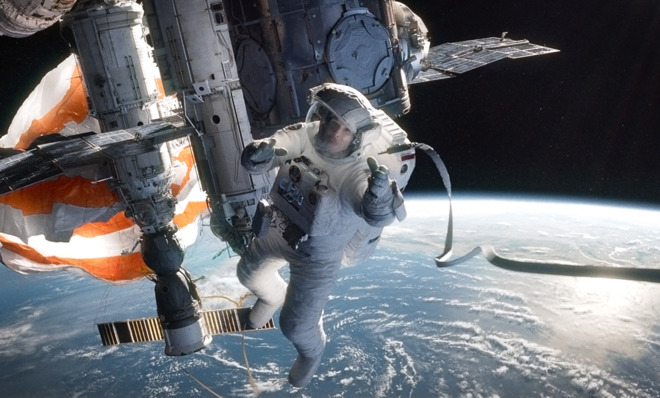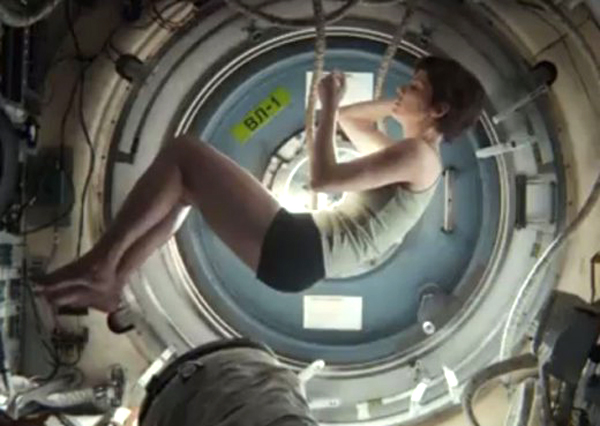Girls on Film: The real lesson of Gravity
It's not about visual spectacle or edge-of-your-seat excitement. It's about rebirth.


A free daily email with the biggest news stories of the day – and the best features from TheWeek.com
You are now subscribed
Your newsletter sign-up was successful
Gravity, which details one woman's struggle to survive a space catastrophe, has descended on moviegoers with dizzying effect. After wowing audiences at the Toronto International Film Festival, the film hit wide release last week, breaking October box office records for its weekend gross and marking the best opening weekend ever for two powerhouse actors: George Clooney and Sandra Bullock.
Gravity's box office records are matched by an almost universal critical adoration; both the forgiving and strict critical aggregators Rotten Tomatoes and Metacritic offer the same high level of critical praise for the "jaw-dropping," "sublime," and "remarkable" film. And Gravity is pure spectacle entertainment in which the experience clearly trumps the storytelling, the kind that leads to feverishly excited and hyperbolic praise, which in turn fuels the film's main theme: rebirth.
Bullock's Dr. Ryan Stone faces all manner of adversity on her quest for survival in Gravity, but director Alfonso Cuarón has no interest in framing it as a parable of perseverance. It is clearly, and often audaciously, a 91-minute exploration of rebirth — a theme hammered into the viewer repeatedly, from glimpses of the doctor curled up in the fetal position with a cord swimming from her stomach, to allusions of frogs and Darwinian evolution. It is a quest for Stone and a message for the audience, as Cuarón noted to The Daily Beast: "There's a big sense of adversity that's happening right now in the world, and it's how we can cope with it."
The Week
Escape your echo chamber. Get the facts behind the news, plus analysis from multiple perspectives.

Sign up for The Week's Free Newsletters
From our morning news briefing to a weekly Good News Newsletter, get the best of The Week delivered directly to your inbox.
From our morning news briefing to a weekly Good News Newsletter, get the best of The Week delivered directly to your inbox.

Between the obvious message and the cinematic excitement Gravity evokes, rebirth resonates, not just as a way of coping, as Cuarón suggests, but as hope for the future. This is, after all, a film in which a 49-year-old actress carries most of the feature on her shoulders, to near universal acclaim and monetary success, beating out her opening weekends for hit films like Speed and The Proposal. In one slick, fell swoop, Cuarón has made a perfect modern rallying film to battle the idea that women can't lead blockbusters and that success or failure rests on gender and age and not, say, the atrocious writing and filmmaking that has plagued many of Hollywood's feeble Catwoman-esque attempts to bring female stars into the blockbuster fold.
Kathryn Bigelow's history-making Best Director Oscar led to pronouncements of "The Bigelow Effect" changing the industry. Sundance seemed to spark change this year by offering an equal number of male and female filmmakers in competition. And let's not forget Bullock herself, whose hit The Proposal made her the first woman "to have a film marketed with her name solely above the title" make more than $200 million domestically.
While Bullock's recent work, specifically, speaks of change for her (as she shrugs off the one-hit comeback trend to break records, earn an Oscar, and star in the most successful live-action comedy of the year {The Heat} before breaking records with Gravity), recent female success haven't sparked any palpable overall change. The Bigelow Effect was a nice chorus of crickets chirping, and female directors are all but invisible this year outside of a handful of films and festival buzz; none of the big feminist successes in recent years have changed the statistics and habits. Instead, excitement builds, the status quo sinks in, and the cycle repeats with a new one-off feat.
But the Hollywood system isn't the only challenge to Gravity's message of rebirth; it's also the film itself. It is no surprise that James Cameron is "stunned" by the film, declaring it "the best space film ever done, and it's the movie I've been hungry to see for an awful long time." It is Cuarón applying his own filmography's mother-centric bend to the classic Cameron format birthed in the Alien trilogy.
A free daily email with the biggest news stories of the day – and the best features from TheWeek.com
Gravity checks all the boxes — visual awe and slick special effects over all else, a female hero who must persevere where her male colleagues fail, and most importantly, a marked focus on motherly instincts and distress. The film is one extraterrestrial away from Aliens, which focused on a woman whose ass-kicking power was inextricably linked to her struggles with motherhood. In Cameron's shadow, Gravity's rebirth becomes remake, taking the old ideas cinema loves and giving them a slick and shiny new package that allows viewers to forget how familiar the story is.
But there's a call for rebirth in Gravity that is valuable. For all of the film's flaws and awe, it tells its story through the character Hollywood would swear is most likely to fail. Dr. Ryan Stone is a woman with classic mommy issues, but she's also almost half a century old and free of the usual mix of brawn and beauty the industry expects. She both mirrors Sigourney Weaver's Ripley and evolves beyond her. Stone doesn't need an original film as a 30-year-old gal in bikini briefs or franchise success before playing a bald and brassed off 50-something fighting to stay alive. She just needs a good filmmaker, good effects, and a script that can hold it all together. She is Hollywood's do or die challenge for long-needed rebirth.
Time and time again, Stone is tethered to all things safe — satellites and astronauts whose help is necessary, but not paramount. Help is a momentary aid she must learn from before cutting the cord and breaking out on her own, allowing herself to learn and be reborn. For Stone to have any chance of survival she must find the will to break free of the comfort.
That is Gravity's true power and message of rebirth. The impressive impact of the visuals will fade as technology advances; it will, like all mixes of CG and live action, morph from the awe-invoking spectacle to the old and obviously fake. But the lesson it boasts is strong, if Hollywood finds a moment to absorb it. The safety of the familiar is sure to teach us important and life-saving lessons that will bring us success, but they are only as strong as our ability to cut the cord and take the risk to be reborn.
Girls on Film is a weekly column focusing on women and cinema. It can be found at TheWeek.com every Friday morning. And be sure to follow the Girls on Film Twitter feed for additional femme-con.
Monika Bartyzel is a freelance writer and creator of Girls on Film, a weekly look at femme-centric film news and concerns, now appearing at TheWeek.com. Her work has been published on sites including The Atlantic, Movies.com, Moviefone, Collider, and the now-defunct Cinematical, where she was a lead writer and assignment editor.
-
 6 of the world’s most accessible destinations
6 of the world’s most accessible destinationsThe Week Recommends Experience all of Berlin, Singapore and Sydney
-
 How the FCC’s ‘equal time’ rule works
How the FCC’s ‘equal time’ rule worksIn the Spotlight The law is at the heart of the Colbert-CBS conflict
-
 What is the endgame in the DHS shutdown?
What is the endgame in the DHS shutdown?Today’s Big Question Democrats want to rein in ICE’s immigration crackdown
